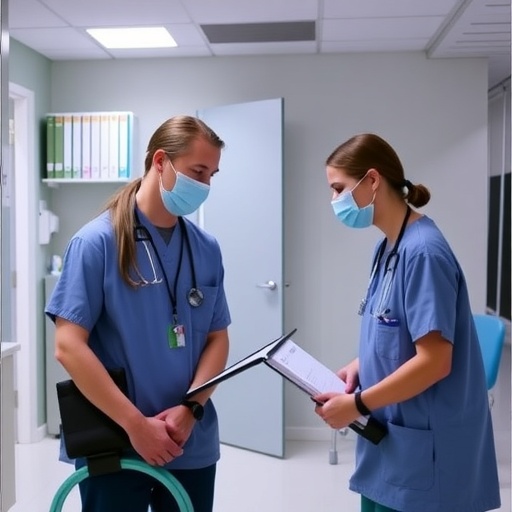In the fast-evolving landscape of healthcare, one domain that has gained significant attention is that of anesthesia nursing. A groundbreaking study spearheaded by Yin, Hu, and Wang et al. has paved the way for the development of micro-credentials tailored specifically for anesthesia nursing, based on core competencies. This innovative approach employs the Delphi method, a structured communication technique aimed at reaching a consensus among experts in the field. As the demand for specialized nursing roles grows, it is crucial to define and refine the competencies that constitute the foundation of effective practice within this niche.
The study highlights a significant void in the current nursing education curriculum, particularly when it comes to anesthesia. As surgical procedures become more advanced, the complexity of anesthesia management also escalates. Therefore, it is essential for nursing professionals within this specialty to possess distinct competencies that are not only evidence-based but also aligned with the latest technological advancements. This research not only identifies the necessary skills but also innovatively incorporates them into the credentialing process.
One key aspect of the study is the employment of the Delphi method, which promotes a consensus-building dialogue among experts in the field. This technique involves multiple rounds of questionnaires that gather opinions and refine insights, eventually culminating in a robust set of micro-credentials that reflect the needs of contemporary anesthesia nursing. The thoroughness of this approach ensures that the resultant credentials will be both relevant and rigorous, offering a credible pathway for nurses looking to advance in their careers.
This research was driven by the recognition that traditional nursing education programs often overlook the unique requirements of anesthesia care. As healthcare systems worldwide strive for efficiency and quality, specialized roles within nursing must be formalized through micro-credentials that recognize specific competencies. By focusing on targeted knowledge areas and skills, these micro-credentials serve as an essential tool for empowering nurses and enhancing patient safety.
The findings from this study are particularly timely, given the growing global emphasis on interdisciplinary collaboration in healthcare. Anesthesia nursing is characterized by its close collaboration with anesthesiologists and surgical teams, making it vital for nurses to understand not only the pharmacology involved in anesthesia but also the corresponding patient management techniques. Thus, these newly established micro-credentials will enhance interdisciplinary interactions, leading to improved patient outcomes.
Another crucial component of the research is the emphasis on ongoing education and continuous professional development. Micro-credentials are not merely a one-time certification; they represent a commitment to lifelong learning and professional enhancement. By engaging in micro-credentialing, anesthesia nurses will be better equipped to navigate the complexities of evolving clinical environments, adapting their skills to meet the demands of a rapidly changing industry.
Moreover, the study acknowledges the importance of integrating feedback from various stakeholders, including educators, healthcare administrators, and practicing anesthesia nurses. The collaborative nature of the Delphi process ensures that the competencies outlined within the micro-credentials reflect the real-world experiences and insights of those operating at the forefront of anesthesia care.
Beyond the immediate benefits for professionals seeking specialization, the implications of these micro-credentials extend to the broader healthcare system. With a well-defined competence model for anesthesia nursing, healthcare organizations can expect enhanced quality of care, greater patient safety, and improved team dynamics. As healthcare systems strive toward achieving better outcomes, the development of such competencies within nursing becomes paramount.
Ultimately, the establishment of micro-credentials for anesthesia nursing based on core competencies represents a paradigm shift in nursing education and professional development. By recognizing and formally validating the specialized knowledge required for this field, we equip nurses with the necessary tools and confidence to excel. As healthcare continues to emphasize the importance of high-quality care and patient safety, these micro-credentials will undoubtedly contribute to advancing the profession of nursing.
As healthcare continues to evolve, the role of the anesthetist also continues to expand. With more advanced techniques and procedures being developed, there is a corresponding need for ongoing education and specialization among nursing professionals. The authors of the study have made it clear that these micro-credentials are a direct response to that need, aiming to ensure that those in the field have the most up-to-date knowledge and skills.
The study’s findings will likely inspire similar initiatives in other areas of nursing. The successful application of the Delphi method in developing competencies for anesthesia nursing could be a model for other specialized nursing fields. This level of adaptability is crucial as healthcare grows more complex and interconnected, creating a need for innovative approaches to education and training across various nursing specialties.
In conclusion, the development of anesthesia nursing micro-credentials based on core competencies represents a critical advancement for the profession. By utilizing the Delphi method, this research acknowledges the unique operational realities within the field of anesthesia nursing, ensuring that it meets the demands of current medical practices. As a result, nurses equipped with these credentials will not only enhance their career trajectories but also contribute to improved patient care, setting a new standard in the industry.
Subject of Research: Anesthesia nursing micro-credentials based on core competencies.
Article Title: Developing anesthesia nursing micro-credentials based on core competencies: a Delphi study.
Article References:
Yin, X., Hu, H., Wang, L. et al. Developing anesthesia nursing micro-credentials based on core competencies: a Delphi study.
BMC Med Educ 25, 1583 (2025). https://doi.org/10.1186/s12909-025-08199-z
Image Credits: AI Generated
DOI: https://doi.org/10.1186/s12909-025-08199-z
Keywords: Anesthesia, nursing education, micro-credentials, core competencies, Delphi method.




